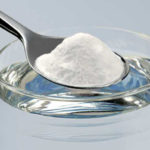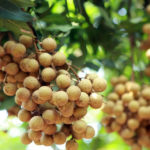Korean pears are a popular choice for consumers due to their delicious flavor and the array of health benefits they offer. Let’s explore what makes this fruit a favorite among many!
1. An Overview of Korean Pears
 Korean pears, also known as Asian pears or Catherine pears
Korean pears, also known as Asian pears or Catherine pears
What are Korean Pears?
Korean pears, also known as Pyrus pyrifolia, are a type of fruit native to South Korea, but they are also cultivated in Australia, the United States, and New Zealand.
Characteristics of Korean Pears
Korean pears have a unique appearance that sets them apart from the common pear varieties found in Vietnam. Specifically:
They resemble apples in shape.
The skin is a pale yellow color with a few white spots.
The flesh is white and crisp, with a sweet and slightly sour taste.
Nutritional Information for Pears
According to studies, Korean pears contain approximately 120 calories and 1.6g of fat per fruit. Additionally, every 100g of this fruit provides the following nutrients:
- 14mg of sodium
- 13mg of potassium
- 11g of carbohydrates
- 0.5 mg of iron
- 1mg of vitamin C
- Various vitamins, including A, B1, B2, B3, B5, and E.
2. Why Are Korean Pears So Popular?
 Korean pears are beloved for their numerous health benefits.
Korean pears are beloved for their numerous health benefits.
Korean pears are widely popular due to the myriad health benefits they offer. Here is a list of the advantages of incorporating these fruits into your diet:
Diabetes Prevention
 Korean pears help regulate blood sugar levels.
Korean pears help regulate blood sugar levels.
Anthocyanin, a compound found in Korean pears, aids in balancing blood sugar levels, thereby reducing the risk of developing diabetes.
Immune System Boost
 Korean pears are rich in vitamin C, which boosts immunity.
Korean pears are rich in vitamin C, which boosts immunity.
The high vitamin C content in Korean pears strengthens the body’s natural defenses, reducing the likelihood of catching the flu or a cold. Additionally, these pears contain vitamins B2, B3, and B5, which provide a boost of energy.
Cardiovascular Health
 Korean pears contain potassium, which helps maintain healthy blood pressure levels.
Korean pears contain potassium, which helps maintain healthy blood pressure levels.
The presence of potassium in Korean pears contributes to regulating blood pressure and promoting cardiovascular health.
Bone Health
The mineral boron, found in Korean pears, assists the body in absorbing calcium, resulting in stronger bones.
Cancer Prevention
The fiber content in Korean pears is known to reduce the risk of certain types of cancer.
Additional Benefits of Korean Pears
 Korean pears offer a range of additional health benefits.
Korean pears offer a range of additional health benefits.
Korean pears are also known to:
Relieve cough and clear phlegm.
Treat sore throat, inflammation, and mild fever.
Help with urinary tract obstruction.
Alleviate constipation and support digestive health.
Moisturize the lungs and reduce bronchial inflammation.
Prevent birth defects.
Reduce the risk of stroke and combat free radicals.
Reduce eye inflammation and redness.
Promote skin health and beauty.
3. Price and Availability of Korean Pears
 Korean pears typically range in price from 80,000 to 230,000 VND per kilogram.
Korean pears typically range in price from 80,000 to 230,000 VND per kilogram.
The price of Korean pears can vary depending on the variety, time of purchase, and the method and location of purchase. You can expect to pay anywhere between 80,000 and 230,000 VND per kilogram. These pears are available at large supermarkets and online through e-commerce platforms.
This concludes our overview of the beloved Korean pear. We hope you found this information useful, and we wish you good health!





































